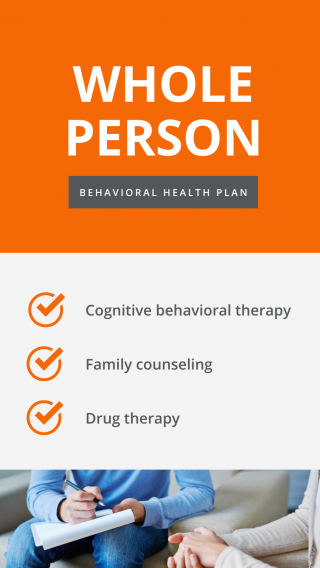Phil Walls, RPh
Chief Clinical Officer
Two years on, the COVID-19 pandemic continues to impact society, including our injured workforce. Last year, we drew attention to patients who are dealing with long-term effects of the pandemic, a phenomenon known as post-Covid-19 syndrome, or “long COVID”. Along with the list of effects we discussed, there is a growing understanding of the complex behavioral health issues that many people with long COVID are facing.
Common Post-Covid Mental Health Issues
Fatigue, sleep disturbances, anxiety, and depression are the primary conditions being reported by patients dealing with some form of complications related to a COVID-19 diagnosis. In fact, it is estimated that prevalence of psychological or neurological symptoms six months after contracting the disease may range from 2 – 10% of patients up to 30%. These patients are a complex mixture, including some who have spent time in an intensive care setting and were then discharged into a rehab facility, as well as those who are seeking help for behavioral problems months after recovering from less severe cases.
Post-COVID Depression & Anxiety Treatments
When it comes to treating these issues, behavioral health specialists and other providers have learned much in the past two years about building effective care plans, but there are still many challenges. While patients with compensable work-related COVID-19 claims face many of the same obstacles as the broader patient population, stakeholders in the workers' compensation industry should be aware of several unique considerations.
From a pharmacy standpoint, it’s essential to understand the role that drug therapy plays in treating the behavioral health component of a long COVID case. Specifically, drug therapy needs to be balanced with a comprehensive approach to behavioral care that includes other interventions.
Something else that can benefit decision makers is a clear understanding of why a particular drug was prescribed. Today, many drugs are prescribed for off-label uses, particularly in the case of psychotropic drugs used in behavioral health. Therefore pharmacists cannot assume that a drug like an antidepressant is being used to treat depression. On the other hand, claims professionals often have access to critical insights into why a particular drug was prescribed that can have a meaningful impact on patient care.
Balancing Drug Therapy in a Comprehensive Behavioral Health Plan
There is no shortage of medications on the market that can effectively treat the mental health issues that many long COVID sufferers are facing. But too much significance is often placed on drug therapy and what it can accomplish. Drug therapy alone should never be used to treat a psychological condition.
There is a growing understanding that a comprehensive, whole-person behavioral health plan is critical to achieving the best possible results for a wide range of issues. Psychological counseling, such as cognitive behavioral therapy (CBT) and social resources such as family counseling should be at the core of any plan. The best behavioral care plan varies according to an injured worker’s unique circumstances, but drug therapy typically should only play a supportive role.
An analogy is how pain medication should be used in the recovery process for musculoskeletal injuries. The proper scope of medication should be to relieve pain just enough to support other parts of the treatment program, especially physical therapy. By strengthening the body and increasing range of motion, physical therapy is crucial to true healing and rehabilitation. If pain is too severe to complete a therapy program, medication can make it possible where it wouldn’t otherwise.
We can look at prescription medications used to treat mental health in much the same way. Drug therapy works to help break patients out of certain mental patterns at a chemical level, but it is typically not intended for long-term use. Instead, drugs like antidepressants or sedative hypnotics should be helping to maximize the benefits of other behavioral therapies and interventions.
As an example, many prescriptions for sedative hypnotics require additional clinical interventions to ensure the best long-term outcome. These drugs, such as Ambien, are widely used in workers compensation, but are only intended for short-term use. Hypnotics are designed to help recover from a lack of sleep while a patient receives behavioral care and training in optimal sleep hygiene practices such as a regular bedtime, lowering the lights, and reducing screen time.
The takeaway here is that for any workers’ comp claim that includes a behavioral health component, such as a long COVID case, drug therapy needs to be carefully monitored and properly integrated with a holistic behavioral care plan.
For Prescriptions, Knowledge is Key
To properly address emergent or preexisting behavioral health concerns in long COVID cases, it is also important for stakeholders to know why a particular drug has been prescribed. This is because of the prevalence of off-label use of pharmaceuticals, particularly for psychotropic drugs such as antidepressants and antipsychotics.
In many situations, these drugs are prescribed off-label for pain management, which can create a hurdle where there isn’t the necessary information to understand where a certain drug fits in the larger treatment picture.
Right now, it isn’t possible for a PBM to look at prescription data and assess how many patients are being treated for behavioral care because of this widespread off-label use. An antidepressant prescribed for a patient dealing with a post-COVID-related mental health issue may have far different indications than the same antidepressant being prescribed as part of a pain management plan. Although a potential solution would be requiring physicians to provide the reason a drug is being prescribed, currently, claims professionals are crucial to ensuring correct implementation of drug therapy for behavioral health cases.
As frontline workers, claims professionals have access to resources, including physician notes that PBMs and pharmacists do not always have. This insight means these people are very often the bridge to the correct solution when a PBM needs to perform a drug review or other intervention. Knowing whether an antidepressant was prescribed for post-COVID depression or pain management is critical when analyzing dosage, days’ supply, potential drug interactions, and other key aspects of the pharmacy benefit.
Taking a collaborative, knowledge-sharing approach can ensure that every party has the information they need to make effective care decisions for these highly complex post-COVID cases. For clients with compensable COVID claims, the myMatrixx Clinical Pharmacy Department is working hard to identify and address people at risk of post-COVID-19 syndrome. We have also developed and continue to update formularies designed to help with appropriate prescriber drug selection and facilitate authorization by claims professionals.
Our Clinical and Sales teams are happy to help you learn more about how myMatrixx can work to achieve your claims management strategy.


